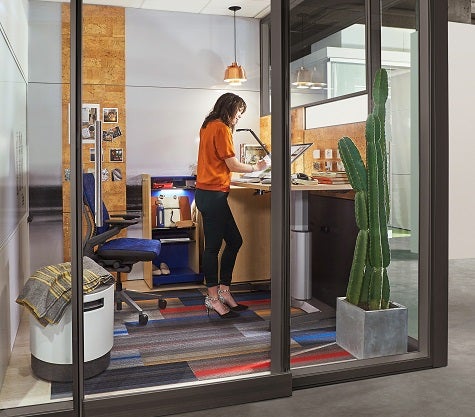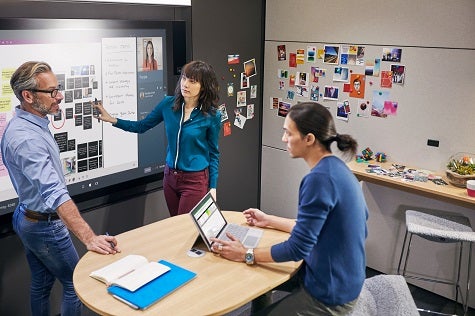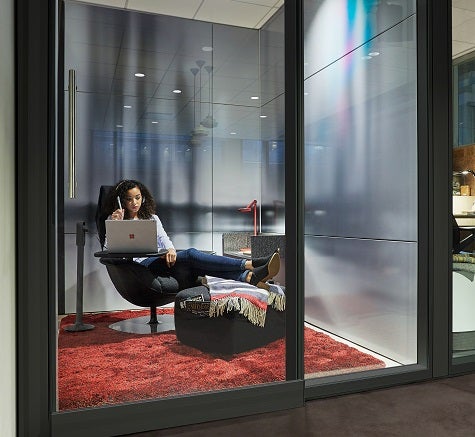I hate cubicles with a passion and I know I’m not the only one. The guy who came up with the idea of the cubicle went to his grave hating them worse than I do. They were supposed to be emergency office space, something to be used as a result of a crisis or disaster, not something folks had to effectively live in for hours on end. A few years back, Conan O’Brien visited Intel and compared its cubicle farm to hell. Intel redid the entire floor after he left.
Way back in 2007, I saw progress to address this cubicle problem but, sadly, progress hasn’t been what I’d hoped.
Well, apparently Steelcase, which sells a ton of cubicles, along with Microsoft, got the memo. They are collaborating on making a line of office furniture and accessories that could actually make you want to come in to work again.
Cubicle Hell
I think the most memorable cubicle experience I ever had was going to a now shut-down IBM site in San Jose, where the accounting and HR folks were put into a beautiful, new, all-glass building, but not allowed to see the view. You see, some executive thought that people would fight to get a cubicle by a window so they put a walkway around the perimeter of the building and walled it off so no one could actually see outside. Except for the top floor, where the executives had expansive views of the valley in their well-appointed offices. The top folks got a view; the folks who did the work got something like eight stories of above-ground basement and fluorescent light. I had a nice big office with no windows and it felt like being locked in solitary confinement for the day. I only spent a couple of years at that site, but thinking back, it felt like more than a decade.
IBM was hardly alone. The cubicle mentality ranged, and still ranges, from small to large companies. And largely because firms are heavily cost focused, and didn’t seem to care that much about productivity, or at least, couldn’t measure it as well, the executives focused on the costs they could see and not the productivity they couldn’t. However, with the application of analytics, suddenly firms are coming to grips with problems associated with excess absence, sickness and mental health issues tied to slamming people into fluorescent lighted hell pits for weeks on end. Fortunately, also, a few of these executives who came out of these pits had something called “empathy” and also felt motivated to fix the problems.
Microsoft and Steelcase Solutions
Microsoft and Steelcase are proposing something closer to open-plan designs. Yes, they do have a version of cubicles, but their version has low walls. This allows employees to see out into the building and not feel walled off; they are less likely to feel they are in a space smaller than would be legally allowed for criminals in solitary confinement.

You’ll notice standing desks as part of the proposal. I have a Steelcase treadmill desk myself that I should likely use more often, but these things are life savers because, increasingly, we are connecting chronic health problems to folks sitting too much.
Offices have windows so that people can see out and feel a stronger part of the working community, and collaboration spaces are less like large versions of walled boxes and more conducive to people actually working with each other rather than talking at each other. The Microsoft Surface Hub stands out as a major part of this and it is uniquely designed to make people who are remote feel more like they are part of the collaborative process. On Surface, it is interesting to note that Steelcase has created unique micro-cubicle desks specifically for those who are hoteling or need some privacy, specifically designed for products similar to the Surface like 2-in-1 laptops and optimized for the unique kickstand that partially defines that product. You can see an example of this type of work space at the bottom of this page.

Wrapping Up: Work Spaces Influence Employee Health
We’re having issues with younger and older working people. Young people coming in and facing cubicles and a strict work ethic are having surprisingly high rates of mental health issues, and those who have been sitting on their butts for most of their careers are having a whole host of medical problems, all of which are dramatically reducing productivity and raising medical insurance costs. Microsoft and Steelcase appear to be recognizing this problem and moving to address it, hopefully both with offerings to their customers and changes to their own working environments. In the end, I think that every firm should take a look around and realize it is time to recognize and step up to addressing this problem and end the pervasive hell of traditional cubicle farms and windowless offices.

Maybe then, fewer people will end up feeling like Joe in this clip. I’m sure more than one of us can identify with Joe’s departing words and that is just sad.
Rob Enderle is President and Principal Analyst of the Enderle Group, a forward-looking emerging technology advisory firm. With over 30 years’ experience in emerging technologies, he has provided regional and global companies with guidance in how to better target customer needs; create new business opportunities; anticipate technology changes; select vendors and products; and present their products in the best possible light. Rob covers the technology industry broadly. Before founding the Enderle Group, Rob was the Senior Research Fellow for Forrester Research and the Giga Information Group, and held senior positions at IBM and ROLM. Follow Rob on Twitter @enderle, on Facebook and on Google+













